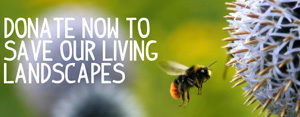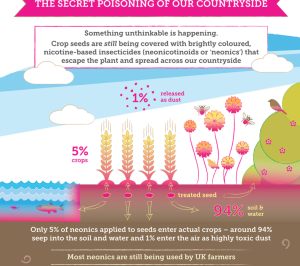Help the Soil Association to achieve a total ban of neonicotinoids. The new DDT?
Something unthinkable is happening. Neonicotinoids are still contaminating our countryside, and poisoning our wildlife.
A new study from Sussex University, part-funded by the Soil Association, confirms the impact of neonicotinoids or ‘neonics’ may be far worse than we thought. Neonics are toxic to insects and birds that eat pesticide-contaminated plants. And this new research has found that neonicotinoid pesticides aren’t acting alone: wildflowers near crops treated with neonics are often contaminated with numerous pesticides in addition to neonicotinoids. Evidence suggests these pesticide cocktails may be 1000 times more toxic than neonicotinoids alone.
Hedgerows that were once safe havens are now death traps for bees, birds, butterflies and other animals and their future survival is at risk.
There is a partial ban currently in place, but it’s temporary and it only covers certain types of neonicotinoids. This half-hearted ban is not enough. If our countryside and wildlife is going to have any chance of survival we need to act now to make the ban permanent and total.
There is a better way
Organic farms are true safe havens where studies show that wildlife is 50% more abundant. That’s because organic farmers work with nature to provide a welcoming home for birds, bees and butterflies. Your donation will help fund more scientific studies, hold more MPs to account and put more pressure on EU politicians for a full and permanent ban.
Download Soil Ass infogram ” The Secret Poisoning of our Countryside” (part displayed below)
Interested in Citizen Science and our pollinators? The Buzz Club
Interested in Bumblebees? Bumblebee Conservation Trust
Interested in award winning bumblebee or solitary bee observation nest boxes?
Interested in how friendly are bee friendly plants from garden centres?
Interested to know how neonics work?
Interested in species specific science papers Do neonics harm other wildlife besides bees?



Everything to do with neonicotinoids is detrimental to our planet
Though the manufacturers and companies that make £s from them which would beg to differ! Thanks for sharing your view. Cheers, George